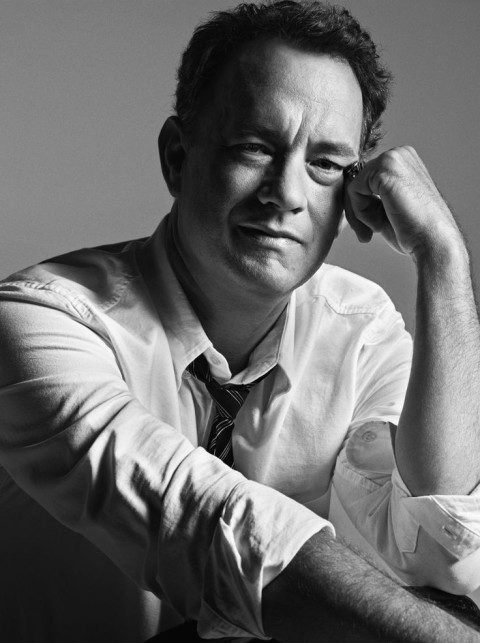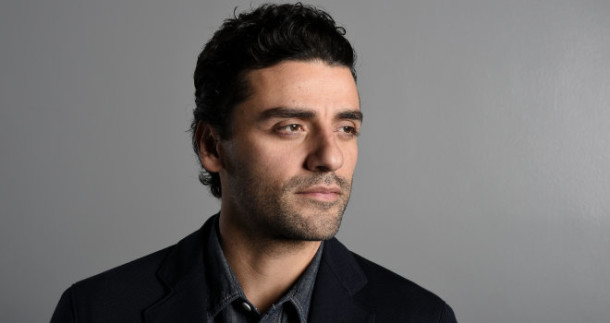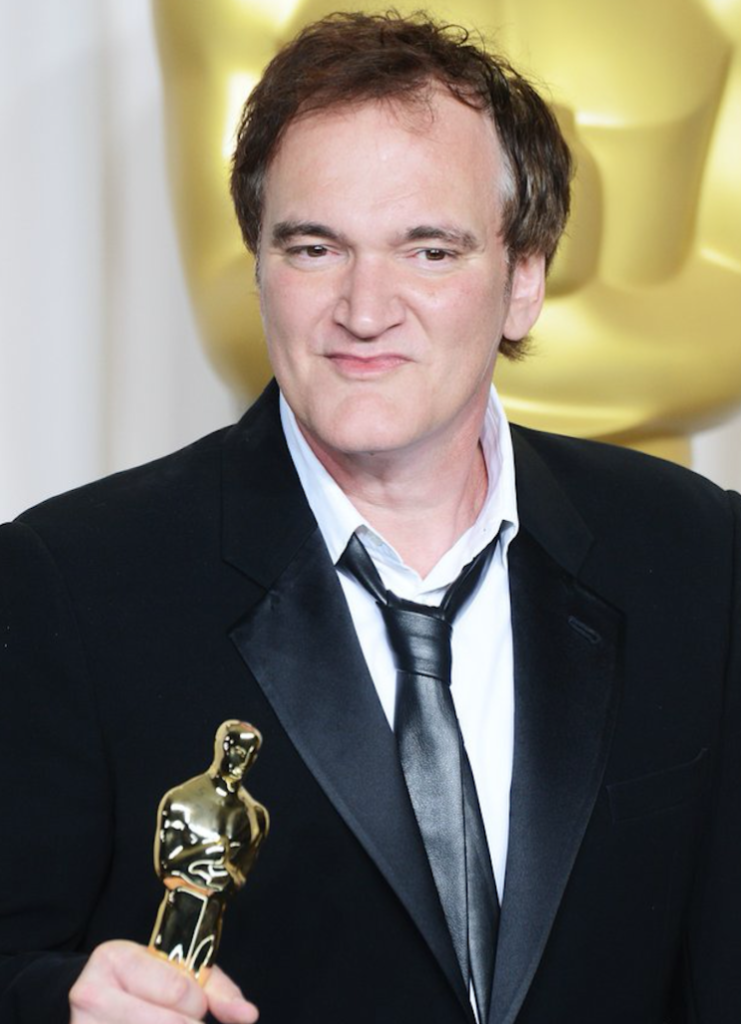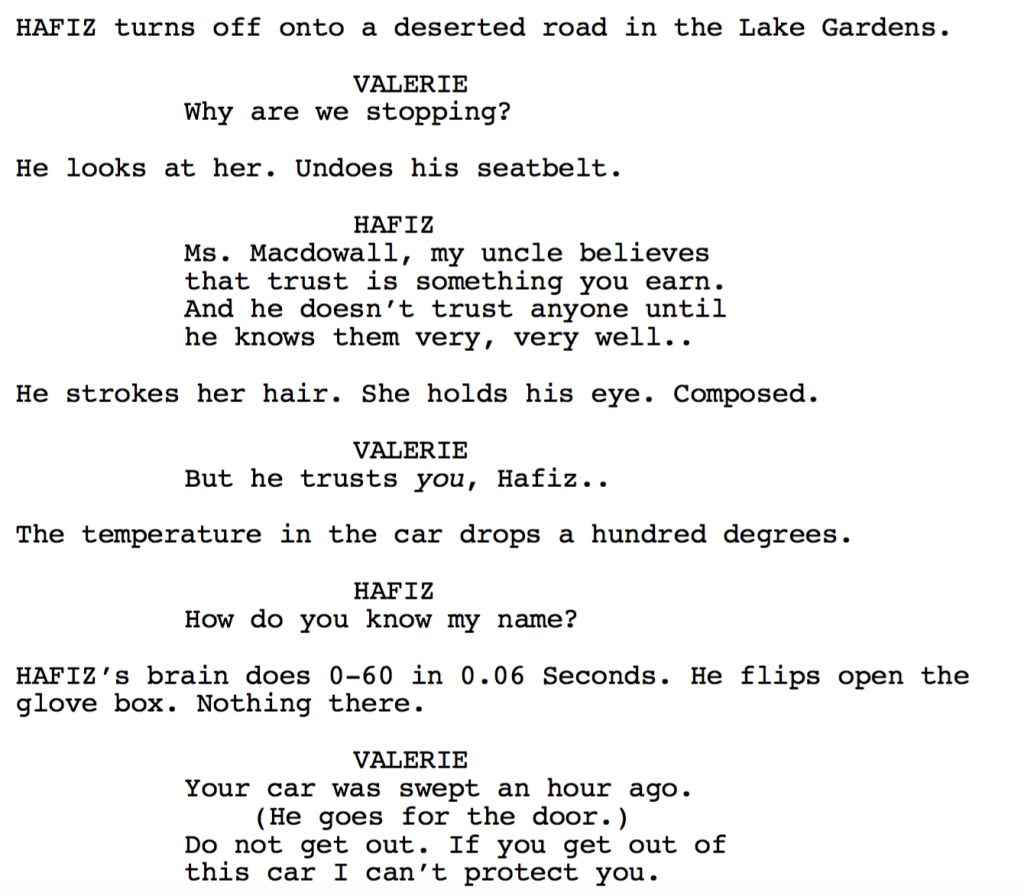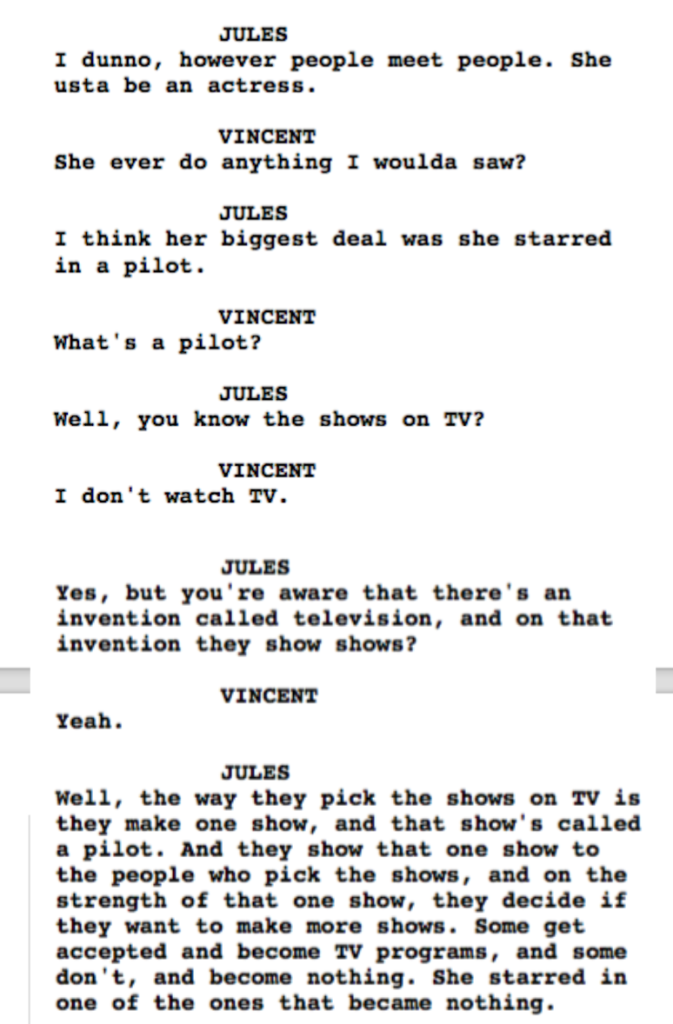Genre: Drama – True Story
Premise: In 1971, The Washington Post had to make a decision on whether to publish the infamous “Pentagon Papers,” which exposed a multitude of injustices that the government was hiding about the Vietnam War.
About: Unknown screenwriter, Liz Hannah, has just pulled off a miracle. Her script, The Post, which made last year’s Black List, has attached Steven Spielberg to direct, and will star Tom Hanks and Meryl Streep. Hmm, I wonder if this movie will be up for any Oscars. Up until this point, Hannah’s biggest claim to fame was as a production assistant on Ugly Betty. It just goes to show that if you put in the hard work, keep writing, and keep getting better at this wacky craft known as screenwriting, good things can happen. Bonus note: This will be the first time that Meryl Streep will work with Steven Spielberg as a live actress (she voiced a part in Spielberg’s A.I.).
Writer: Liz Hannah
Details: 117 pages
If you asked every screenwriter what their biggest dream was, I’m sure number 1 on the list would be a 7 figure spec sale. But number 2 is probably that Steven Spielberg wants to direct your script.
I don’t think the average amateur screenwriter realizes just how difficult that is, though. Spielberg directs about one movie every two years. It’s not hard to do the math. He’s probably got 5-7 movies left in him. To secure one of those projects with a script of yours? It’d be like winning the lottery. Hell, it’s probably tougher than that.
But The Post is a tricky project that perpetuates a movie type Hollywood would like to distance itself from: Old White People making movies about Old White People. We’re supposed to be more diverse, more progressive, moving away from #OscarsSoWhite. A bunch of white dudes and one white woman clamoring for Academy attention doesn’t fit that mold. So it’ll be interesting to see where this goes.
The year is 1971 and Katharine “Kay” Graham has inherited the prestigious Washington Post after her husband, beloved by everyone, blew his brains out. Kay doesn’t want to own the paper. In fact, she doesn’t know what she wants. She’s just trying to figure out what comes next.
Meanwhile, Ben Bradlee, editor of The Post, is doing his best to keep up with the New York Times, which always seems to be a step ahead of the Post. Just as he’s using that problem as a rallying cry to motivate his work force, the Times prints the first set of the Pentagon Papers, papers stolen from the White House that expose the government for all sorts of injustices that occurred during the Vietnam War.
The Times story is immediately shut down by the government after an injunction, leaving what may be the most important story ever to disappear from the public eye. That’s when Bradlee realizes that the Post can come to the rescue. If they can get a hold of these papers, they can print them, saving both America and his paper.
There’s only one problem. Kay is BFFs with everyone in the White House. Hell, she and her husband used to hang out with JFK. By printing these documents, which are likely illegally obtained, she not only destroys all her government relationships, but she puts the paper at risk of being sued by the White House. Worst case scenario: there might not be a Post if these papers are printed.
Bradlee, who was good friends with Kay’s husband, has never liked Kay, nor Kay him. But if this once-in-a-lifetime story is going to be printed, these two will have to find common ground and work together. And they’ll need to do it before the government swoops in and puts the kibosh on these papers for good.
When you zoom out, there are a lot of things to like about The Post. For starters, its two main characters, Kay and Bradlee, don’t like each other. What do you want at the heart of every piece of drama? CONFLICT. So when your two main characters are diametrically opposed to everything the other does, you’ve taken the first step towards a good movie.
The stakes in The Post are also very high. You get the sense that, if published, this article could change the world. Oh, and let’s not forget about the urgency. Our crew only has 9 hours to decide whether they print the story or not. If they wait another day, the government will probably come in and kill the story.
The biggest problem with The Post though is how Inside Baseball it is. If I went to the casual sports fan and said, did you know Kris Bryant of the Cubs has a WAR (Wins Above Replacement) of 7.7? Chances are they’d stare at me like I had 16 heads. More tellingly, they wouldn’t give a shit. They just enjoy watching Kris Bryant play.
All this stuff in The Post about how the paper is run, with the editor, the CEO, the president, the owner — I didn’t care about any of it. But worse, it prevented me from enjoying the goddamn story (aka watching Kris Bryant play).
One of the keys to writing a great script is to identify the main story points then build a plot around them, stripping away everything else. The main story points in The Post are the conflict-laden relationship between Kay and Bradlee, the conflict-of-interest in Kay’s friendships with the government, finding the Times’s source who had the papers, and, finally, the decision of whether to print the papers or not.
Whenever the script stayed with one of those points, it was good. When it drifted into the tiniest details of The Post and its reporters, it lost me. That’s the Inside Baseball stuff you don’t need. And I realize there’s a fine line. You do want detail in your story. But it’s your job to know when the details start to interfere with the drama. And that happened too many times here.
Another issue I had was Kay herself. Her backstory was wonderful. She’s a woman whose husband was beloved by all, who then shot himself, leaving her as the reluctant owner of the paper, and who detests her position because she doesn’t fit into the Good Old Boy’s network.
Here’s the thing though. Kay doesn’t want anything to do with the paper. So she doesn’t really care about the Pentagon Papers. To her, they’re more an annoyance than anything. “Annoying” isn’t dramatic. One of the reasons we’re so invested in Bradlee’s plight to print the papers is because he actually gives a shit.
What they should’ve done is focus less on how Kay doesn’t care about the paper, and more on Kay’s relationships with people in the government. Then, as Kay got closer to printing the papers, she’d have to make decisions on whether to destroy all those relationships in the name of the story. A character who doesn’t give a shit either way isn’t a very interesting character.
I’m torn by The Post. It has the requisite conflict within it to merit a movie. But its drama gets buried in unnecessary details and a main character who doesn’t even want to be involved. Maybe Spielberg will exploit the script’s strengths by streamlining the story. I hope so. If this is just another Inside Baseball stuffy #OscarsSoWhite movie, I don’t think it can thrive, even with its A-list talent.
[ ] What the hell did I just read?
[x] wasn’t for me
[ ] worth the read
[ ] impressive
[ ] genius
What I learned: Wanna supercharge a character? Give them a conflict of interest. Kay has a duty to do what’s best for the paper. However, she’s good friends with the Secretary of Defense, Robert McNamara, the man who’s done all these horrible things that are exposed in the Pentagon Papers. Whenever your characters’ decisions are difficult, you’re creating dramatic tension. Whenever your characters’ decisions are easy, you’re creating boredom.
Congrats to Scott Serrandell who won this past weekend’s dialogue mini-contest. Some really funny dialogue, exactly what I was I was looking for. I’ll be looking forward to see what he does in the official Scriptshadow Short Script Contest.
Genre: Drama
Premise: (from The Black List) A multigenerational love story that weaves together a number of characters whose lives intersect over the course of decades from the streets of New York to the Spanish countryside and back.
About: Dan Fogelman broke onto the scene with the original Ryan Gosling and Emma Stone pairing, “Crazy, Stupid, Love.” His next project, the oldies-Hangover film, Last Vegas (which he made clear to me was written BEFORE The Hangover), was a sneaky hit. Mixed in there were The Guilt Trip and Danny Collins, neither of which did well. Nowadays, Fogelman has moved over to television, with his viral NBC show, This is Us. “Life Itself,” a highly ranked 2016 Black List script, is his return to features and will star Oscar Isaac and Olivia Wilde. Fogelman will direct.
Writer: Dan Fogelman
Details: 116 pages
Dan Fogelman is one of the biggest screenwriting success stories of the past decade. He came out of nowhere five years ago to sell three huge specs at a time when everyone thought the giant spec sale was dead. And he was doing it with the kinds of movies Hollywood doesn’t make anymore, mid-budget light-as-a-feather dramadies with heart.
Things looked bad when one of his biggest sales, Danny Collins, however, failed badly at the box office. It was looking like Fogelman was in trouble. So he just hopped over to the TV side where he now has one of the most buzzed about shows on television (This Is Us). When you think about it, Fogelman’s character-first stories were always better for television anyway. So we probably should’ve seen it coming.
But now Fogelman’s back with a feature. Let’s see how he did.
I have to admit, the last thing I expected when I opened a Dan Fogelman script was Samuel Jackson screaming at me. Yes, Samuel Jackson is our narrator. At least for now. There’s a lot of “at least for now” in Life Itself. To give you a taste of that, we meet Julianne Moore a few pages later. And Julianne Moore gets slammed into by a bus, her bones and guts sprayed everywhere.
Yes, Life Itself is Dan Fogelman unhinged.
Confused yet? I was. Eventually, after things settle down, we meet Will Dempsey, a sometimes-writer who’s devastated by his pregnant wife, Abby, leaving him. Will was so destroyed, in fact, that he spent six months in a nut house. Now he spends most of his days talking to his therapist, who looks a lot like Julianne Moore.
We jump back in time to see how these two met. You’ve never seen two people more perfect for each other and more in love than these two. Which begs the question – how could Abby possibly leave Will?
To answer that question, we’ll need to get into spoilers, as Life Itself is one giant spoiler-fest. Which makes sense since life itself is a spoiler fest. So don’t read on if you don’t want to know what happens. I’ll be semi-vague in order to protect the script’s twists. But what we learn is that Abby and Will didn’t divorce. A far worse tragedy occurred. And that is why Will has gone off the rails.
Oh, but if you think that’s all you’re getting here, let me remind you that Life Itself is DAN FOGELMAN UNHINGED. After getting over the shock of the earlier tragedy, Fogelman hits us with a DOUBLE TRAGEDY that was so shocking, I spent the next ten pages reading the script through tears. No, I’m not kidding.
Without getting into too much detail, we cut to years later where we follow Will and Abby’s daughter, Dylan (named after Abby’s favorite musician, Bob Dylan), growing up, and explore how the tragedies of her earlier life have turned her into the rebellious and dangerous beauty she is today.
In the meantime, we follow a poor Spanish family who is peripherally attached to Abby and Will. And, at a certain point, we realize that that Spanish families’ story is going to loop back around and re-intersect with that of our original characters. But while we’re praying it intersects the way we hope it will, there are no promises when it comes to Fogelman’s most twisty and turny narrative yet.
I apologize that summary was so vague but there are too many major twists and turns and I don’t want to ruin them ahead of the film. That makes this script difficult to analyze but I’ll do my best.
I want to start with bravery. As a writer, one of your jobs is to evolve. Each script you write, you want to push yourself into new, even uncomfortable, territory. If all you’re doing is rehashing the same old characters and storylines that you always do, you’re never going to write anything great.
I did not recognize this Dan Fogelman at all. I remembered in his previous scripts that he always played things safe and predictably. He did safe and predictable well. But you always knew what you were getting from Fogelman, and that kept his scripts from ever elevating into awesomeness.
Life Itself is a whole other beast. At first, Sam Jackson is breaking the fourth wall, screaming at both us and our hero. Then Julianne Moore gets violently slaughtered by a bus. Then we’re hit with two major fucking traumatic twists within a ten page period. Then, for the second half of the script, we’re meeting this whole other family in Spain…
It’s like, “What the hell??”
Truth be told, this story is better suited for a novel or a television show. Whenever you have multiple characters and you really want to delve into those characters (I mean, beyond the basic likable trait and character flaw), you need time. And you can only get that with the 60,000+ words a novel affords you or the 7+ seasons a TV show does.
When you try to do the same thing with a feature, you always run up against the problem of plot. Features need the plot to keep moving. And that always conflicts with character development. Yes, you can do both. And the best writers do. But only to an extent. I don’t care how talented you are. If you need your characters to destroy the Death Star by the end of the movie, you need to keep your plot moving along. And that takes away those slower character-driven scenes that are such a staple in TV shows.
And yet, Fogelman gets as close to pulling it off as one can. I’m not sure how he does it but I want to say the twists are a big part. He knows that because there’s no plot, if he hits you with 40 scenes in a row of characters saying I love you and I hate you, we’ll be bored to death. So he slams you with these huge shockers that we never saw coming and it’s like this jolt of espresso that powers us through another 15 pages of character development until the next twist arrives.
I do think this approach finally bit him in the ass, though. Because the first act was so strong and so unexpected, the second quieter half, with the Spanish family, couldn’t quite live up to it. And while there will always be parts of a screenplay that play better than others, you should try to make it so that each quarter of your script is better than the previous quarter. That’s because you want your final quarter to bring the house down. And in Life Itself, it’s the first and second quarters that bring the house down.
Still, this is quite an achievement. It’s unlike anything you’ll read all year. It’s complex yet a surprisingly quick read (one of Fogelman’s specialities). I would go so far as to say this is his best script. Could it have been better had he hit a home run in the 3rd Act? Sure. But I’d still recommend this to anyone wanting to learn how to write vibrant memorable characters.
[ ] What the hell did I just read?
[ ] wasn’t for me
[ ] worth the read
[x] impressive
[ ] genius
What I learned: As much as I hate flashbacks, there’s no question that they help the reader care about a character more. For example, if I introduced you to John, the hockey player with an attitude, all you see is a hockey player with an attitude. But if, at some point, I flash back to when John was a child and showed that he witnessed his father beat his mother to death, that character is fleshed out ten-fold. He carries so much more weight. That’s what Fogelman does here on multiple occasions and it really helps his characters shine.
All right, guys. In honor of the upcoming short script contest (You’ve got 9 days left to enter – and it’s free!), we’re going to do another short script weekend mini-contest.
Last weekend we did dialogue-focused shorts and the results were a mixed bag. The short and sweet of it? You guys are better than last week. So we’re going to try this again. What I want you to do is read yesterday’s new dialogue article and then write a short script that is dialogue-focused.
The requirements are 2 of the following…
1) Irony
2) Looming sense of dread
3) Sexual tension with an obstacle in the way.
4) Use dialogue obstacles to keep the dialogue fresh.
Also, remember the basics. Utilize conflict and/or tension within the scenario. Characters say more interesting things when there’s some sort of problem in the scene. That problem can be on the surface or under the surface. Also, it’s hard to have characters say interesting things if they are not interesting themselves. So make sure your characters are unique in some way.
You can do this. Really push yourselves. Come up with some unique situations and some unique characters and have fun with the interaction.
Post your short in the comments (you can write the scene inside the comment itself or include a PDF link). Page count is open but I recommend staying under 8 pages. The winner will be determined by how many UPVOTES they get (Disqus allows you to upvote a comment – so please UPVOTE any short you enjoy).
Contest ends Sunday at 10pm.
Good luck to all!!!
I’m not going to lie. I wasn’t thrilled with the results from last week’s dialogue challenge. Nobody blew me away with any world-changing dialogue. It seemed like some people weren’t even paying attention to the dialogue. They had an idea for a short and dialogue happened to be a part of it. I take responsibility for this. Obviously, something I’m saying isn’t getting through.
So I want a do-over. I think you guys are capable of much better. And we’re going to be learning from the master today so I’m hoping that’ll inspire you. But before we start, there was one issue from last week I want to eliminate immediately…
TOO MUCH DESCRIPTION
When dialogue is being featured, you don’t want anything mucking it up. And nothing mucks up dialogue faster than a bunch of description. You want the reader’s eyes on the center of the page. You don’t want them to keep looking left to read some superfluous action. It KILLS the rhythm of the scene. And rhythm is one of the keys to great dialogue. So please: KEEP DESCRIPTION TO A MINIMUM WHEN FEATURING DIALOGUE.
Now, on to today’s three dialogue tips, inspired by Quentin Tarantino.
IRONY
Like most things in screenwriting, dialogue improves with irony. You achieve this by having your characters speak in a manner that’s the opposite of who they are. A famous example of this is Jules and Vincent in Tarantino’s Pulp Fiction. They’re the chatty hitmen. They’re talking about burgers, footrubs, TV pilots. Hitmen aren’t supposed to be fun and chatty. So it’s ironic. And audiences eat irony up. Nuns talking about fucking. Clowns talking about suicide. Kids talking about 401ks. Use irony to write better dialogue.
LOOMING SENSE OF DREAD (SUSPENSE)
Set up a scenario by which something bad (or potentially bad) is coming, draw the resolution out as long as possible, and have fun with the dialogue in the meantime. The space between the beginning and end of a line of suspense is one of the easiest places to write dialogue because your audience is so dialed in. This allows you to have fun with your dialogue as well as the particular conflict within that scene. The best example of this in Tarantino’s world is the beginning of Inglorious Basterds. Hans the Nazi comes into a farm house looking for Jews (who happen to be hiding underneath the floor). Tarantino has so much fun as we wonder if Hans is going to find what he’s looking for. Also note that Hans is a chatty polite Nazi (irony!).
SEXUAL TENSION WITH AN OBSTACLE IN THE WAY
An easy way to bump up your dialogue is to put two characters with heavy sexual chemistry together, then place an obstacle in the way of them being able to act on that attraction. The bigger the obstacle, the better the dialogue will play out. Tarantino’s most famous scene ever is built around this conceit: Vincent Vega and Mia Wallace going out for dinner. Vincent is doing this as a favor to his boss, who’s married to Mia. So the obstacle between them is as big as it gets. If Vincent does anything with Mia, he will be killed (as Tarantino cleverly set up in the earlier scene between Vincent and Jules). This is why the sexual chemistry (and subsequent dialogue) crackles so much. Because they fucking want each other but cannot talk about or act on it. This creates subtext, which adds a whole other layer underneath the already fun dialogue that’s happening on the surface. An easy way to write great dialogue.
BONUS TIP: DIALOGUE OBSTACLES
I’ve already told you guys to place obstacles in front of your hero’s goal. So if Daniel is trying to defeat Johnny in the karate tournament, you give him a broken leg (obstacle) to make achieving his goal even harder. What I’ve noticed about Tarantino is he places obstacles in his dialogue. So it’s rarely as simple as, “Are you okay today?” “Yeah, how bout you?” “Tough day at work.” “Hey, one day at a time, right?” Instead, when someone says something, he’ll have the other character challenge it, or say he doesn’t know what he’s talking about. This is the “obstacle” that forces the first character to re-route or explain things further. What this does is it gives the dialogue more of an unpredictable pattern, and adds a playfullness to it. Here’s an example:
Notice how he says, “I don’t watch TV.” That dialogue obstacle leads to the best line in the exchange, “Yes, but you’re aware that there’s an invention called televsion, and on that invention they show shows?” That line is nowhere to be found without a dialogue obstacle.
And there you have it. If you look at Tarantino’s less memorable scenes, they’re usually scenes that aren’t utilizing these tips. For example, the Butch and Fabienne motel room scene in Pulp Fiction talking about pancakes has some fun exchanges, but it’s way slower than a typical Tarantino scene because it isn’t using any of these devices.
So tomorrow, that’s what this weekend’s short contest will require. You’ll have to use two of these four devices. And also, remember to have fun with your dialogue. Stay away from the mundane and the obvious. Memorable dialogue requires characters to say things in colorful, unexpected, and unpredictable ways. I didn’t see enough of that last week. Hopefully, that will change tomorrow!
AND DON’T FORGET TO SIGN UP FOR THE OFFICIAL SCRIPTSHADOW SHORT SCRIPT CONTEST! IT’S FREE AND THE WINNER GETS THEIR SHORT PRODUCED!!!
The author of the best selling book and mega-smash box office hit, The Martian, comes to bat with his first TV pilot!
Genre: TV Pilot – 1 hour drama
Premise: “Mission Control” follows the NASA mission control unit as they attempt to push a new space station into orbit, which will eventually fly to Mars.
About: Andy Weir, of “The Martian” fame, is coming to CBS with a TV show. Oh, and who’s producing it? Some guy named Simon Kinberg, who’s only in charge of some of the biggest franchises in Hollywood (you may have heard of them – Star Wars, X-Men).
Writer: Andy Weir
Details: 62 pages
Uh, the writer of The Martian writes a TV series about the next generation of NASA.
SIGN ME UP PLEASE!
Andy Weir is in that unique position every writer would amputate their left foot to be in (since feet aren’t required for writing). He’s the author of a hit movie, which means every producer in town wants his next project. If he nails that next project, he becomes a superstar.
But holy shit is TV tough. I don’t know if “competitive” is the right word to use, since there are 400 slots available. But the audience will tell you if they don’t like your show. As soon as those eyeballs disappear, you’re done. Hell, Matt Effing Damon and Ben Freaking Affleck just had their sci-fi show canceled the other day. If it can happen to Mark Watney, it can happen to anyone.
Let’s hope it doesn’t happen to Mr. Weir.
Mission Control follows two factions of people, the folks down in NASA’S mission control unit, and the people up on a next-generation space station called Durga. Julie Towne, a whip-smart leader who burns the candle at both ends, is preparing Durga to move from low-orbit to high-orbit, where it will eventually fly to Mars.
Meanwhile, NASA’S having image problems. Their gorgeous African-American public affairs officer, Rayna, is trying to clean up a nude pics scandal from one of their astronauts, the similarly stunning Deke, who happens to be a heiress to billions. Deke isn’t too bummed out about the fallout since all the feedback from her pictures has been positive.
Back on Durga, they’re awaiting a group of Russian cosmonauts who, I believe, will be helping them fly to Mars. But just before the Russians get there, the power goes out. They get the power back up again, but Julie’s convinced that this could be part of a bigger issue that will rear its ugly head somewhere down the line.
While everything appears to get resolved (for the most part) by the end of the episode, we cut to 14 months in the future to see a giant explosion above earth. Might it be Durga? Might it be the Russians’ shuttle? And what does it mean? Only way to find out is to hand over control… to Mission Control.
A pet peeve of mine has always been pilot title pages that give us both the title of the show, and the title of the show’s first episode. It’s like, dude, slow your roll with all the titles. All I need is one.
But after reading Mission Control, which doesn’t have an episode title (it just says “Pilot”), I understand why an episode title is helpful. Yes, you are writing the first episode of a show that will last multiple seasons. But you also have to tell a singular story within this episode – “a story within the story” if you will. By forcing yourself to come up with a title for this individual show, you’re forcing yourself to think of it as an individual story.
That’s Mission Control’s biggest weakness. The pilot doesn’t really have a story. People are introduced. There’s lots of running around. We’re jumping between the mission control room, the space station, and everywhere in between. But I couldn’t figure out what the purpose of any of it was.
My best guess is that it’s about moving the Durga Space Station from low orbit to high orbit. Which, in plot terms, isn’t exactly, “I just got stranded alone on Mars.” So Weir is working from a place of weakness from the get-go, trying to make something feel bigger than it is.
Any screenwriter with a few scripts under his belt knows this feeling. Instead of admitting that there’s something wrong with the concept, we double-down on it, pumping up every muscle we can to give it strength. When deep down we know… there’s a structural weakness that can blow the whole thing up with single well-placed shot into the exhaust port.
Another issue is that Weir’s strength is in science and research. Whenever any of his characters are talking about science, or Weir’s explaining what happens to a space station that’s lost power, he kills it. But once Weir moves from science to people, there’s a clear loss of confidence that accompanies it.
Let’s be frank. Character was never Weir’s strength. Even Mark Watney, the title character in The Martian, wasn’t some great complex character. He was just a sympathetic guy with a dry sense of humor who was stuck on Mars.
But TV is character. If you aren’t good at character creation – at flaws, at inner conflict, at irony, at uniqueness, at inter-relationship conflict, you’re not going to write anything with legs.
And you can see Weir struggling with that throughout the pilot. The biggest plotline of the episode is Deke’s nude photo leak, which feels like it was ripped out of a Grey’s Anatomy Season 1 episode. Indeed, Weir feels like a guy who doesn’t like Shonda Rhimes being forced to write like Shonda Rhimes. Heck, there’s even a character named Izzy (arguably, Rhimes’s most popular character).
I don’t know what’s going on with that. It might be that Weir is new to the TV scene and watched a ton of popular television to figure out how to write a pilot and came up with this Shonda Rhimes NASA Frankenstein take. Or, maybe this is CBS telling him to make it “more like Shonda Rhimes,” more mainstream.
All I know is that, right now, this has the same problem as Cameron Crowe’s Aloha did. It’s trying to marry science tech with sexy people and those worlds don’t coexist organically. So the final product feels awkward.
Weir needs to take a tip from, well, himself. The Martian was a plot that shouldn’t have worked as a movie. It has an enormous time line, way too much science, and endless plotting. But the producers embraced what the movie was and told it as is. And it worked!
Mission Control shouldn’t be about Kim Kardashian-esque nude photo scandals. It should be about geeky dudes doing really amazing shit. Stick with what got you here, man. Embrace the nerdocity. Unless Weir makes that transition, this show is going to be stuck in outer space.
[ ] What the hell did I just read?
[x] wasn’t for me
[ ] worth the read
[ ] impressive
[ ] genius
What I learned: Have a beginning, middle, and end to your pilot, just like you would a feature. The only difference is that not everything will be wrapped up at the end of a pilot. You’ll still leave some major questions unanswered. But use the Scriptshadow Formula (Goals, Stakes, Urgency) to create a clear story narrative and follow that to the end. In the pilot for last year’s biggest TV spec sale, Designated Survivor, the story was that half of the government was wiped out in a terrorist attack and the newly instated president needed to find out what happened. Boom, there’s your GSU. On the contrary, if all you’re doing is setting up characters while vague plotlines swim aimlessly in the background, you’re not going to have much of an audience by the end of your pilot.

